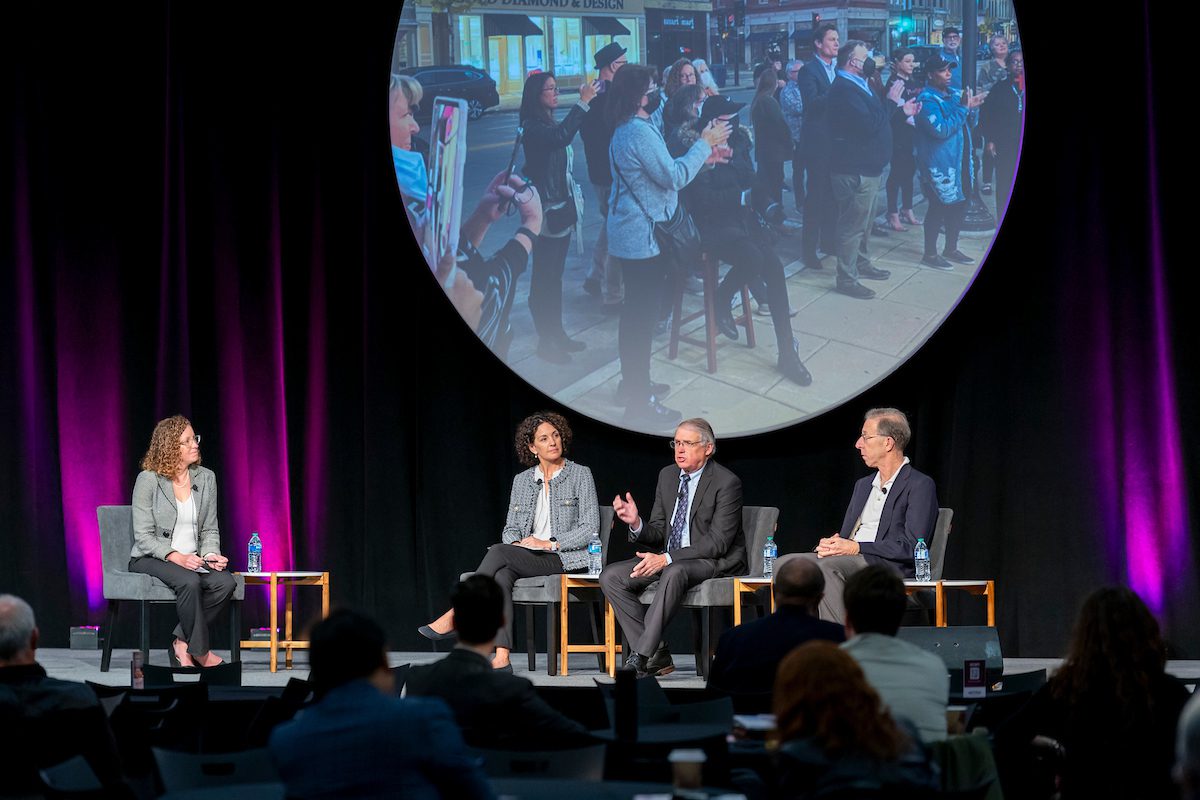Too often, initial discussions of community challenges can devolve into frustrating criticism sessions that reach a dead end, leaving opportunities for change in the dust. But across Wisconsin, communities are finding ways to move beyond complaining into a constructive approach to building the future. Community officials discussed their route to success at WEDC’s Wisconsin Economic Summit in Appleton on Oct. 24.

WEDC’s Senior Downtown Development Director, Errin Welty, moderates panelists Tina Crave, President & CEO, of Greater Watertown Community Health Foundation, Tim Casey, Director of City Development, City of Kenosha, and Paul Scharfman, President, Specialty Cheese Company as they discuss how they’ve built public and private partnerships for community success. Wisconsin Economic Summit WEDC Oct. 24, 2023. (Photo © Andy Manis)
In Jefferson County, for instance, employers are having trouble recruiting employees because of a housing pinch.
Tina Crave, president and CEO of the Greater Watertown Community Health Foundation, said the first step toward a solution was conducting a study that found the area is 3,500 units short of the housing it needs. The foundation partnered with Thrive Economic Development, WEDC, and Jefferson and Dodge counties to form the Heartland Housing Initiative, a program to bring hands-on housing development assistance to municipalities there. Heartland is funded with federal, county, and philanthropic funds to help overcome the lack of capital that was a barrier to more housing development. Last September, it rolled out a revolving loan fund to help spur housing development.
“We have $3 million committed to the fund and a goal to raise up to $10 million to support addition of 500 housing units over the next five years,” Crave said. “We have three projects on the table with applications [requesting] about $5 million.”
“It’s really easy to get people to come to the table and complain about problems,” Crave added. “The hard part is helping individuals understand what they can do. I think that starts with helping understand the root causes behind the problem.”
In Reeseville, business was a powerful driver of another partnership initiative. Paul Scharfman, president of the Specialty Cheese Company, said his fast-growing business was able to triple employment even at a time of low unemployment.
Partnering with University of Wisconsin-Madison demographic experts and learning that child care, transportation, and housing were prime concerns for potential employees, Scharfman set up a ride share program that costs him $20 per person per day. Then, he decided to pay $20 per employee each day for child care.
But Scharfman went further, enlisting the aid of local government officials to make a community child care plan and looking into how he could set up a child care center. He donated six acres adjacent to his plant, and construction will begin soon on the center, which will have room for 45 children.
“My guess is, in coming years, my company will employ all of the staff at the child care center, give them our company’s full benefit package, and then rent them to the child care center,” Scharfman said to applause from the audience. “That’s collaboration. I win; the community wins. Most importantly, God’s creatures, the children, win.”
Collaboration is alive and well in Kenosha, too. There, officials are working to redevelop two properties to reinvigorate the city.
Tim Casey, Kenosha’s director of city development, said community involvement was central on a pair of projects: the Kenosha Emerging Leaders Academy (KELA) and the Kenosha Innovation Neighborhood (KIN).
Sixth graders through young people in their early 20s participate in KELA, a partnership providing technical skills training, mentorship, and academic support to prepare them for job opportunities. As part of that project, the city worked with partners in youth development, education, technology, and workforce development to create a pipeline to local employers.
KIN will build on a 107-acre vacant former factory site that required $50 million in state and federal cleanup assistance and an area destroyed by rioting and civil unrest in 2020.
“We will rebuild, and we will do better: That’s been the ethos that has permeated Kenosha for the last three years,” Casey said. “People have said, ‘What can we do? How can we work together?”
Plans call for a new Kenosha Children’s Library, a grocery store and retail development, housing, restaurants, the LakeView Technology Academy, and a business incubator. The city won a Workforce Innovation Grant from WEDC to work with Gener8tor to work with startup founders of color and women entrepreneurs in Kenosha—more evidence that around the state, public-private partnerships are working.
